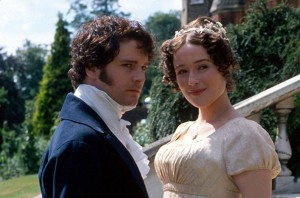We’re all familiar, no doubt, with the character of Mr Darcy from Jane Austen’s classic ‘Pride and Prejudice’. Women the world over, for generations in fact, have swooned over this character in print and certainly the BBC miniseries from 1993 is still a particular favourite.
A recent commentary by Jason Evert, who promotes the Catholic idea of chastity to high school students in the US, got me thinking about Mr Darcy – go figure.
Jason had this to say about ‘Twilight’: ‘[‘Twilight’] reveals a crisis of masculinity in our culture. There aren’t a lot of chivalrous guys out there and so when you portray one in a fictitious story the girls are like: that’s what I want. I want a guy who protects me. I want a guy who wants what’s best for me.’
So why did that make me think of Mr Darcy? Well, the way Evert explains the appeal of Edward from the ‘Twilight’ series could well be describing Darcy at the same time. Mr Darcy, despite the fact the Elizabeth has already rejected his hand, tracks down her younger sister Lydia who has scandalously eloped and sets things right.
And what does he say to Elizabeth Bennet when she confronts him over his actions? ‘You must know, it was all for you.’ He acted for her, defending and protecting her because he loved her. In today’s culture no doubt, Darcy would be shot down by a radical feminist for having the gaul to defend and protect any woman.
Yet, the defining quality that appeals to women in these fictional men is their chivalry. What exactly is chivalry and is it still relevant today? In real people, not just characters out of novels?
Boys will be boys
A recent interview on ABC program ‘One plus one’ saw Steve Biddulph, a parenting expert and psychologist, postulate that men are currently in a state of perpetual boyhood because the social mores that surrounded men’s coming of age in previous societies do not exist today. He argues that men are currently ill equipped to deal with responsibilities in some spheres because they have not made the transition to real manhood.
“I’m not blaming men and I’m not just saying, `spend more time with the kids’. I’m saying, `your role as a man is irreplaceable. There are things that only a man, only a dad can do’. This is politically incorrect, but I say it anyway.” He says.
Another who agrees with him is Peter West, who writes: ‘But it is impossible to change patterns and attitudes relating to one sex without influencing the other. One unfortunate by-product of feminism has been the proliferation of negative attitudes towards men. People talk of “the opposite sex” as if one sex was somehow opposed to, or completely different from, the other. Public discourse often refers to “the other side’s troops” and similar, suggesting a wholesale gender war. Thus, while in earlier times, men and women were seen as complementary, men are now seen as redundant.’
Further to this he argues that: ‘Representations of men in the media are overwhelmingly negative, “something dangerous to be contained, attacked, denigrated or ridiculed, little else” . While it is unacceptable to portray women negatively, it is acceptable to trivialise or ridicule men… In sum “men in contemporary western societies are presented with a misandric world that devalues, marginalizes, demonises, objectifies and attempts to change them.”’
Therefore men do not grow up and mature as they and women, need them to, but continue to lead lives that value the selfish pursuits of boyhood when he only had to look out for himself. They do not value their own masculinity because of the conflicting views they see in the media around them.
Instead of the traditional masculine roles of provider and protector, they are seduced with ideas of a pseudo masculinity where they use others – primarily women – for their own gratification.
In essence, something has happened to take chivalry out of the equation and chivalry is necessary in the transition between boyhood and manhood. Without chivalry we only have boys in men’s bodies, yet we want them to act like men.
So, what happened? In a nutshell, radical feminism. Yes, we women are to blame for the state that men are in. During the height of radical feminism we told men that we no longer wanted them to protect and defend us, to be our providers, we could do it ourselves.
But instead of achieving that gender equity that we desperately sought after, we only tipped the scales and yes, it is we women who now hold the balance of power in gender relations, we are the ones who are oppressing men, because we have taken away that which makes them men, their masculinity.
Chivalry, past and present
So then, what is this chivalry? And can we bring it back to save men from women?
Well, in a nutshell chivalry defines the role of men in their given society and basically defines ‘their manners, their responsibilities, their relationships to women, and even to God.’
‘Chivalry is the impulse to do good, to behave well, to live according to one’s higher instincts in harmony with others. The impulse is an attraction to heroes of the highest virtues, the desire to be like them.’ (chivalrynow.net)
Though chivalry is perhaps best exemplified by medieval history and stories of the Holy Grail where knights were on a quest for both personal and spiritual perfection, it is still very relevant today.
Why? Because at its very core, chivalry is a code of honour where men respect all people, and fight for justice. They defend those under their protection and fight for the weak or disadvantaged. Basically, chivalry is the higher code that controls and regulates masculine behaviour.
For example a chivalrous husband and father would protect and defend his wife and children without thinking of the consequences. He would put their happiness ahead of his own.
A husband who is stuck in perpetual boyhood would focus instead on his own happiness and reflect that his wife and children are not making him happy and they should be.
Chivalry is selfless and geared to others; lack of chivalry is selfish and geared to oneself.
Chivalrous gestures
As one dating site says ‘She may be as capable as a man, but she is, in fact, a lady’ (askmen.com) and it is the extra things that men can do for you that will show his respect for you. If the weather’s cool and he offers you his jacket, or it’s raining and he offers you an umbrella – take it! Let him open the door for you, pick you up to go out for dinner and he can pay if he wants too.
These are all great ideas, and really the essence here is to just let, and encourage, men to be
men. A great website I found on the modern quest of chivalry outlines a specific moral code, called the ’12 trusts’ that we should encourage men to abide by, and with some tweaking here and there to fit our own femininity we could adhere to a similar code ourselves.
We need to encourage men to take on again this idea of chivalry and live their masculinity in its truest and most fulfilling way, just as we are called to live out our femininity in its truest and most fulfilling way. We need to support each other so that we are complementary in act and in deed. We need to appreciate the distinct differences between men and women, and have respect for the beautiful union of marriage.
Most of all, we have to move away from the hurts of gender inequality on both sides and recognise the beauty and dignity in the sexes as God created them. Who knows, we might just end up with a few more Mr Darcy’s out there after all.
Originally posted 2014-01-29 21:49:23.

